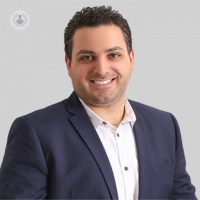Wisdom tooth extraction: Your questions answered by an expert
Written in association with:Wisdom tooth extraction is a surgical procedure to remove one or more wisdom teeth — the four permanent adult teeth located at the back corners of your mouth on the top and bottom. In this informative article, highly esteemed consultant oral and maxillofacial surgeon Mr Mohammed Anabtawi shares his expert insight on wisdom tooth extraction, including key advice for aftercare following the procedure.

When should wisdom teeth be removed?
Wisdom teeth should be removed if they don’t fully emerge or if they cause pain, infection, or other dental problems. Some wisdom teeth may have no symptoms but there may be a problem developing or there is high risk of a problem developing that you may be unaware of.
There is strong evidence to show that wisdom teeth that are mesially or horizontally positioned that have not erupted fully have a high risk of decay occurring within the wisdom tooth and also to the tooth in front. If left alone, the decay may get to the extent that you may develop pain from both teeth.
How are wisdom teeth removed?
Wisdom teeth removal is typically performed by a dentist or an oral and maxillofacial surgeon. The surgery may involve cutting into the gum and removing the tooth either as a whole tooth or in pieces. The procedure can be done under local anaesthetic, general anaesthetic or intravenous sedation. A small cut in the gum is sometimes necessary, and the tooth may need to be cut into smaller pieces before it’s removed.
It takes anything from a few minutes up to twenty minutes, or sometimes even longer, to remove a wisdom tooth. After your wisdom teeth have been removed, you may have swelling and discomfort, both inside and outside your mouth.
How long does it take to recover from wisdom teeth removal?
After surgery to remove a wisdom tooth, it may take seven to ten days for the swelling to go down and two weeks to fully recover. However, this can take longer if there is an infection and in cases where the patient has medical problems affecting the body's ability to heal. Caring for the wound, such as using a rinse from twenty-four hours after the surgery, can help speed up the healing process.
It can take up to two weeks to recover from wisdom tooth or teeth removal surgery. During this time, you may have a swollen mouth and cheeks and this will be worse for the first few days but will gradually improve. Gently pressing a cold cloth to your face helps reduce the swelling, this can be done for 10 minutes on, followed by 10 minutes off. It's important to avoid ice directly touching skin. .
Can complications occur after wisdom teeth removal?
Complications after wisdom teeth removal can include swelling, bleeding, bruising or infection. Painful dry socket, or exposure of bone when the post-surgical blood clot is lost from the site of the surgical wound (socket), is another possible complication of wisdom tooth removal.
Although far less common than dry socket, injury to sections of a nerve called the trigeminal nerve is another possible complication of wisdom tooth removal. It can cause pain, a tingling sensation and numbness or loss of sensation in your tongue, lower lip, chin, teeth and gums. In very rare cases, this can be permanent.
What should I eat after having my wisdom teeth removed?
After having your wisdom teeth removed, it is recommended to eat soft or liquid foods. For the first twenty-four to forty-eight hours, you should eat only liquid and soft foods like blended soups, porridge or mashed potatoes. Cold foods like ice cream or yoghurt may help with some of the discomfort. As you start to feel better, you can try eating more solid foods.
If you require wisdom tooth removal and wish to schedule a consultation with Mr Anabtawi, you can do so by visiting his Top Doctors profile.


